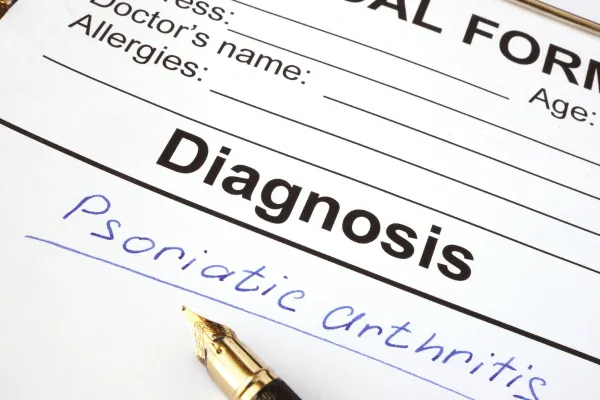Your Guide to Understanding Psoriatic Arthritis
Psoriatic arthritis (PsA) is a condition where our body's immune system mistakenly targets healthy cells, often appearing alongside psoriasis. Beyond skin symptoms, it can impact our joints, internal organs, and even our eyes. It's worth noting that its signs can resemble other conditions, so pinpointing a diagnosis can be a bit of a puzzle.
Navigating life with PsA is a unique journey for everyone. Whether you're new to the diagnosis or have been managing it for some time, having the right information and support is invaluable. Dive into our site for insights on PsA, from understanding the diagnosis to exploring treatments. Alongside, discover tips for daily management, and avenues to advocate not just for yourself but for others too.

Discover 11 Key Insights on Psoriatic Arthritis
1. PsA: Understanding This Autoimmune Condition
Psoriatic arthritis is a condition where the body's immune system unintentionally targets its own healthy tissues, especially the joints and skin. This immune reaction leads to inflammation, resulting in symptoms like joint pain, stiffness, and swelling. It's important to note that without timely and effective treatment, this inflammation can impact the whole body and might result in lasting damage to the joints and tissues.
2. There are Periodic Fluctuations, Known as Flares
It's common for individuals to have varying experiences with their health conditions. Some may encounter regular episodes of heightened symptoms, known as flares, while others might have them less often. These symptoms can range from tender and swollen joints, stiffness, and swelling in the fingers or toes, to discomfort in tendons or ligaments. Some may also notice skin rashes, changes in their nails, fatigue, limited mobility, and even issues with their eyes. We're here to support and understand each unique experience.
3. Expertly Skilled in Camouflage.
Identifying psoriatic arthritis can be challenging as its signs often resemble those of other inflammatory arthritis conditions like rheumatoid arthritis (RA) and gout. It might even be mistaken for osteoarthritis (OA), which is a prevalent type of arthritis. To ensure an accurate diagnosis, your physician will perform a physical examination, gather a detailed medical history, and carry out necessary lab tests.
4. It Boasts Unique Characteristics
Individuals with PsA typically test negative for the rheumatoid factor (RF). If there's a positive RF blood test, the physician might initially consider rheumatoid arthritis. It's interesting to note that RA often results in joint pain that's symmetrical, meaning it's felt on both sides of the body, whereas PsA-related pain tends to be asymmetrical, experienced on just one side. Also, if you notice swelling that covers the entire length of a finger or toe, often referred to as 'dactylitis' or 'sausage digit', it's commonly associated with PsA.
5. Up to One-Third of Individuals with Psoriasis May Experience This Effect
Approximately 30% of individuals with psoriasis may also experience psoriatic arthritis. This indicates that most people with psoriasis don't develop PsA. Nonetheless, it's worth noting that those with psoriasis can still be susceptible to other types of arthritis, such as osteoarthritis or rheumatoid arthritis.
6. Universally Applicable, Regardless of Age or Gender
In the realm of autoimmune diseases, PsA stands out as one where both men and women have an equal likelihood of diagnosis. While it's common for symptoms to emerge between ages 30 and 55 among those with psoriasis, it's worth noting that some cases can be identified during childhood.
7. It could be linked to genetics.
Experts suggest that certain individuals might have a natural predisposition to conditions such as psoriatic arthritis. Research indicates that there's a more pronounced genetic or familial connection with this disease compared to other autoimmune rheumatic conditions. Interestingly, around 40% of those impacted have a close family member who also has psoriasis or psoriatic arthritis.
8. Rest assured, it's not transmissible.
Psoriasis isn't contagious. However, certain infections like strep throat might play a role in its onset. Besides infections, factors such as intense stress, injuries, or events that overly stimulate the immune system could trigger it, especially in those with a genetic predisposition.
9. It's not only about your joints
PsA can impact the joints and may bring about various symptoms such as fatigue, swelling of fingers and toes, and an inflammatory eye condition known as uveitis. It's also worth noting that there's a potential connection between PsA and conditions like heart disease, depression, and metabolic diseases. However, a PsA diagnosis doesn't necessarily translate to a lifetime of health challenges.
10. It's important to remember that not all illnesses are visible.
Psoriatic arthritis presents in various ways, with some signs like skin rashes being more evident. However, many of its symptoms, including joint pain and fatigue, can be less noticeable. It can be challenging when loved ones don't see visible signs, as they might not fully grasp the extent of the discomfort one is experiencing
11. We have effective treatments at your disposal.
Several over-the-counter (OTC) and prescribed solutions are available for psoriatic arthritis management. Some cater to both psoriasis and psoriatic arthritis symptoms, while others focus on skin concerns or joint challenges. Furthermore, many of these treatments can positively influence the progression of the disease by addressing the heightened immune response. Dive deeper to learn more about psoriatic arthritis.
Have a question?
We're Here to Help
By providing my phone number, I agree to receive text messages from the business.


